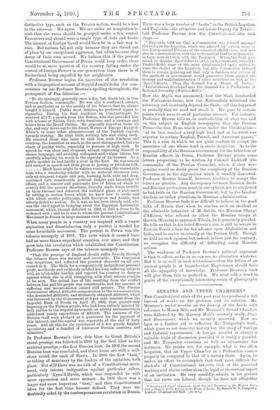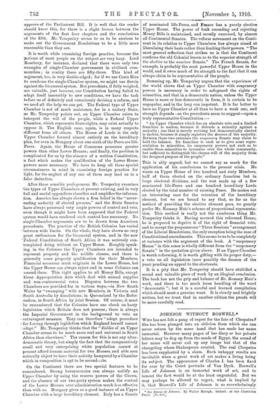• SENATES AND UPPER CHAMBERS.*
THE Constitutional crisis of the past year has produced a full harvest of works on the problem and its solution. Mr. Wontner's useful treatise on the history of the Lords with reference to Money Bills and Mr. Marriott's Second Chambers were followed by Mr. Ramsay Muir's masterly study, Peers and Bureaucrats, which we recently reviewed. Now we have as a further aid to reflection Mr. Ternperley's book, which gives us not domestic history but the story of foreign and Colonial experiments. A foreign parallel is always a valuable basis of discussion, provided it is really a parallel, and Mr. Temperley examines as well as enumerates his instances. He points out, for example, what is too often forgotten, that an Upper Chamber in a Federation cannot properly be compared to that of a unitary State. Again, he makes an effort to accomplish that task most difficult for students of Constitutional law,—to look at the practical working and status rather than the legal or theoretical aspect of an institution. He very candidly admits in his preface that his views are Liberal, though he does not altogether * Senates and Upper Chambers: their Use and Funation in the Modern State, with a Chapter on the Reform of the House of Lords. By Harold W. V. Tezup‘vley. London: Chapman and Hall. Ds. net.] approve of the Parliament Bill. It is well that the reader should know this, for there is a slight lacuna between the arguments of the first four chapters and ths conclusions of the fifth. Mr. Temperley seems to us to be anxious to make out the Government Resolutions to be a little more reasonable than they are.
It is worth while examining foreign practice, because the xotions of most people on the subject are very hazy. Lord Rosebery, for instance, declared that there were only two examples of single-Chamber government in civilised com- munities; in rcality there are fifty-three. This kind of argument, too, is very double-edged; for if we use Costa Rica to condemn the single-Chamber system, we might use Servia against the bicameral system. But precedents, if fully weighed, are valuable, just because, our Constitution having failed to adapt itself insensibly to new conditions, we have the task before us of definitely and consciously devising a reform, and we need all the help we can get. The Federal type of Upper Chamber is not of much assistance, for in a unitary State, as Mr. Temperley points out, an Upper Chamber exists to interpret the will of the people, while a Federal Upper Chamber, which represents State-rights, may exist actually to -oppose it. The English case, again, is in many respects 'different from all others. The House of Lords is the only Upper Chamber formed almost entirely on the hereditary plan, for even in Hungary about one-sixth of the Peers are life- Peers. Again, the House of Commons possesses greater -powers than other Lower Houses; and finally, the problem is -complicated for us by the absence of a written Constitution, a fact which makes the qualification of the Lower House powers more necessary. We have to keep all these special circumstances in mind in examining foreign practice for light, for the neglect of any one of them may lead us to a false deduction.
' After these sensible prolegomena Mr. Temperley examines the types of Upper Chambers at present existing, and in very .full and useful appendices classifies and amplifies the informa- tion. America has always shown a firm belief in the "never- ending audacity of elected persons," and the State Senates 'have always possessed very ample powers of control and veto, even though it might have been supposed that the Federal `system would have rendered such control less necessary. No -single-Chamber arguments are to be drawn from American precedents. The practice of the British Colonies has varied "between wide limits. On the whole, they have shown no very great enthusiasm for the bicameral system, and in the new 'Federal Constitution of South Africa it was seriously con-
• templated doing without an Upper House. Roughly speak- - .ing, in the Colonies the Upper Chambers are intended to • represent property and the middle classes, and there is . generally some property qualification for their Members. 'Financial measures must originate in the Lower House, but - the Upper House can always reject and in some Colonies can amend them. This right applies to all Money Bills, except those Appropriation Acts which deal with annual supplies and non-controversial votes. Disputes between the two Chambers are provided for in various ways,—in New South Wales by " swamping " with new Members, in Victoria and „South Australia by dissolutions, in Queensland by the Refer- . .endum, in South Africa by joint Session. Of course, it must he remembered that the Colonies have one check on hasty ;legislation which Britain does not possess ; there is always 'the Imperial Government in the background to veto an -.extravagant measure. They can therefore "adopt procedure for forcing through legislation which England herself cannot
%adopt." Mr. Temperley thinks that the "dislike of an Upper Chamber seems to be much more real and universal in South Africa than elsewhere." The reason for this is not any ultra- democratic theory, but simply the fact that the comparatively small and very enterprising white population cannot at present afford human material for two Houses, and able men naturally object to have their activity hampered by a Chamber which in composition is apt to be second-rate.
On the Continent there are two special features to be remembered. Strong bureaucracies can always nullify an Upper Chamber by using the reserve powers of the Crown, and the absence of our two-party system makes the control of the Lower Houses over administration much less effective than with us. Hungary gives us a good instance of an Upper Chamber with a large hereditary element. Italy has a Senate of nominated life-Peers, and France has a purely elective Upper House. The power of both amending and rejecting Money Bills is maintained, and usually exercised, by almost all Continental Senates. The reform movement on the Conti- nent in its relation to Upper Chambers has always aimed at liberalising their basis rather than limiting their powers. "The most general reflection that strikes us is that the Continent
confirms the old Colonial lesson as to the superior strength of the elective to the nominee Senate." The French Senate, for example, is probably the most powerful Upper House in the world, and it owes much of its strength to the fact that it can always claim to be representative of the people.
Summing up, Mr. Temperley argues that the experience of the world shows that an Upper Chamber with suspensory powers is necessary in order to safeguard the rights of minorities, and that in a democratic nation, unless the Upper House is more or less democratic in form, it is certain to be unpopular, and in the long run impotent. It is far better to have no Upper Chamber at all than to have a weak one, and
strength depends —so the precedents seem to suggest—upon a truly representative Constitution :— "An Upper Chamber which has an absolute veto and a limited franchise is useless, because it defends a minority against a majority; one that is merely revising but democratically elected is useless, because it simply registers the decrees of the majority. Between these two extremes the suspensory Senate may claim to hold the balance. Its franchise is such as to give some repre- sentation to minorities, its suspensory powers not such as to enable these minorities to tyrannise over the whole community, but sufficient to distinguish the chance will of the majority from the designed purpose of the people."
This is ably argued, but we cannot say as much for the application of his conclusions to the present crisis. He
wants an Upper House of two hundred and sixty Members, half of them elected on the ordinary franchise but in large electoral divisions, aud the rest made up of a few nominated life-Peers and one hundred hereditary Lords elected by the total number of existing Peers. He makes out an interesting case for the retention of the hereditary element, but we are bound to say that, so far as the method of providing the elective element goes, we greatly prefer Mr. Ramsay Muir's scheme of proportional representa- tion. This method is really not the cumbrous thing Mr. Temperley thinks it. Having secured this reformed House, he is prepared to deprive it of the right of financial veto, and to accept the preposterous "Three Sessions "arrangement of the Liberal Resolutions, the only exception being the case of Constitutional amendments. This seems to us to be completely at variance with the argument of the book. A "suspensory House" in this sense is wholly different from the "suspensory Senate" in the quotation given above. If an Upper Chamber is worth reforming, it is worth gifting with its proper duty,— a veto on all legislation (save possibly the finance of the year) pending an appeal to the electorate.
It is a pity that Mr. Temperley should have stultified a sound and valuable piece of work by an illogical conclusion.
The book has not the grip and balance of Mr. Ramsay Muir's work, and there is too much loose handling of the word " democratic "; but it is a careful and learned compilation which should meet a genuine want. It is clearly and brightly written, but we trust that in another edition the proofs will be more carefully read.



































































 Previous page
Previous page